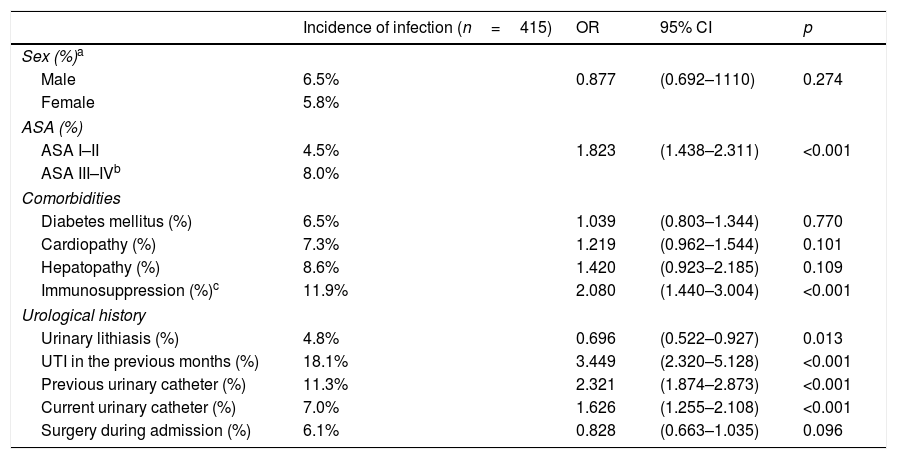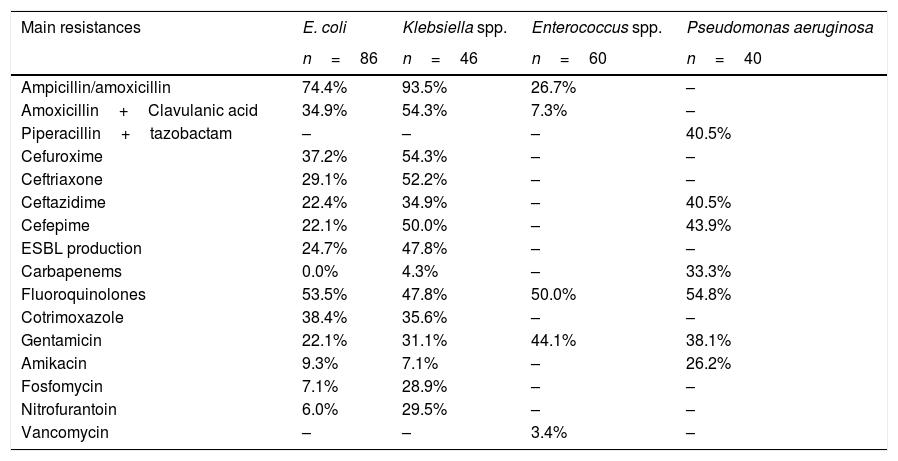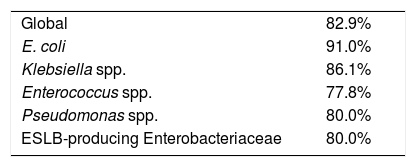To evaluate the suitability of empirical antibiotic therapy in HAIs and the antibiotic resistance patterns of the responsible microorganisms, as well as the incidence of mortality and risk factors involved.
MethodA prospective observational study was carried out on patients of both sexes older than 16years, admitted by any urological process during a period of 4years. The incidence and characteristics of HAIs, as well as the causative organism and its resistance, the initial empirical antibiotic therapy and its modification, if required, and mortality rates are analyzed.
ResultsOut of 6546 patients, 6.3% suffered HAIs, 70.5% corresponding to urinary tract infection and 22.1% to infection of the surgical wound. E.coli, Enterococcus spp., Klebsiella spp. y P.aeruginosa were the most frequently implicated (25.1%, 17.5%, 13.5% and 12.3%, respectively). E.coli and Klebsiella spp. were producers of extended-spectrum beta-lactamases (ESBL) in 24.7% and 47.8%, respectively. 4.3% of Klebsiella and 33.3% of Pseudomonas were carbapenems-resistant. The overall resistance to quinolones was approximately 50%. The most commonly used antibiotics for empirical therapy were cephalosporins of 3rd and 4th generation (33.6%) and carbapenems (28.2%). An overall rate of adequacy of empirical antibiotic therapy of 82.9% was obtained. The mortality rate in patients with HAIs was 2.2%, compared with 0.3% in patients without infection. In a multivariate analysis, the variables associated with the highest mortality risk were the isolation of ESBL-producing enterobacteria and the inadequate empirical antibiotic treatment.
ConclusionsThe selection of empirical antibiotic therapy was quite accurate. An increase in HAIs by multiresistant microorganisms, such as ESBL Enterobacteria or multiresistant P.aeruginosa is being observed. The mortality risk increases with inadequate initial empirical antibiotic therapy or when the responsible microorganism is an ESBL enterobacteria.
Evaluar la idoneidad de la antibioterapia empírica en IRAS y los patrones de resistencia a antibióticos de los microorganismos responsables, así como la incidencia de mortalidad y factores de riesgo en relación con IRAS.
MétodoDurante un periodo de 4años se realiza un estudio prospectivo observacional sobre todos los pacientes de ambos sexos y mayores de 16años ingresados por cualquier proceso urológico. Se evalúan la incidencia y las características de las IRAS y se analiza el microorganismo causante y sus resistencias, la antibioterapia empírica inicial y si esta precisó modificación, y las tasas de mortalidad.
ResultadosDe un total de 6.546 pacientes, el 6,3% sufrieron IRAS, correspondiendo el 70,5% a infección del tracto urinario y el 22,1% a infección de la herida quirúrgica. E.coli, Enterococcus spp., Klebsiella spp. y P.aeruginosa fueron los más frecuentemente implicados (25,1, 17,5, 13,5 y 12,3%, respectivamente). E.coli y Klebsiella spp. fueron productoras de betalactamasas de espectro extendido (BLEE) en el 24,7 y el 47,8%, respectivamente. El 4,3% de Klebsiella y el 33,3% de Pseudomonas eran resistentes a carbapenemes. La resistencia global a quinolonas fue del 50% aproximadamente. Los antibióticos más frecuentemente usados de forma empírica fueron cefalosporinas de tercera y cuarta generación (33,6%) y carbapenemes (28,2%). Se obtuvo una tasa global de adecuación de antibioterapia empírica del 82,9%. La tasa de mortalidad en los pacientes con IRAS fue del 2,2%, frente al 0,3% en los pacientes sin infección. En un análisis multivariable, las variables que se asociaron a mayor riesgo de mortalidad fueron el aislamiento de enterobacterias productoras de BLEE y el tratamiento antibiótico empírico inadecuado.
ConclusionesLa selección de la antibioterapia empírica fue bastante precisa. Se está observando un aumento de IRAS por microorganismos multirresistentes, como enterobacterias BLEE o P.aeruginosa multirresistentes. El riesgo de mortalidad aumenta con una antibioterapia empírica inicial inadecuada o cuando el microorganismo responsable es una enterobacteria BLEE.










